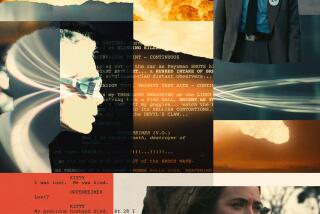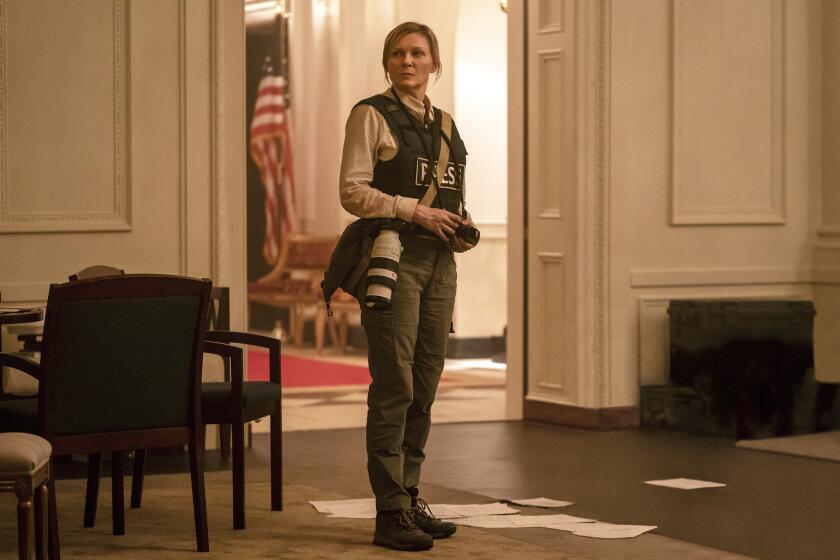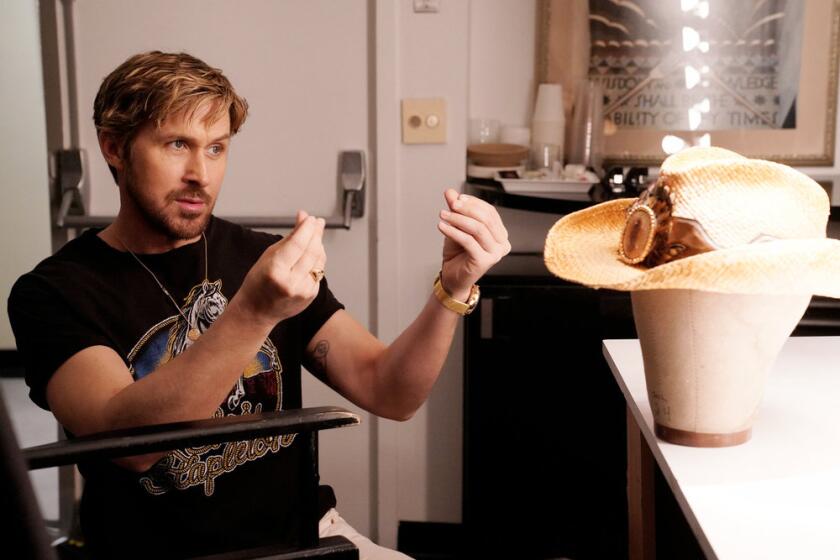‘12 Years’ stars, other actors talk up costumes, characters and more

Harrison Ford, Oscar Isaac, Forest Whitaker , Emma Thompson , Chiwetel Ejiofor and Lupita Nyong’o talk the acting craft with John Horn of the Los Angeles Times.
Do the clothes really help find the character? Is it a good idea to watch your own acting? And are movies sacrificing entertainment to be morally correct?
The performers participating in The Envelope’s Actors Round Table wrestled with those and other questions — when they were not laughing about less serious subjects — during a wide-ranging conversation that ultimately focused on their memorable performances.
The panel was as varied in experience as the films were different. In addition to “42’s” Harrison Ford, our ensemble included Lupita Nyong’o (“12 Years a Slave”), Emma Thompson (“Saving Mr. Banks”), Oscar Isaac (“Inside Llewyn Davis”), Forest Whitaker (“Lee Daniels’ The Butler”) and Chiwetel Ejiofor (“12 Years a Slave”).
VIDEO: Watch the actors discuss their craft
Here are edited and condensed excerpts from the conversation about how actors choose roles, what they need from a director and how clothes really can make the man (or woman):
When you are making a movie, do you actually have a sense that it’s going to turn out well?
Forest Whitaker: I think there’s a time, sometimes, when you’re working that you can feel a transcendence and you know that something special is going on.
Oscar Isaac: I usually can tell when it’s going to be bad, but I can’t really tell when it’s going to be good.
Chiwetel Ejiofor: You’re hopeful in the moment but then you kind of have to forget about that in a way. You’re just working and you’re in the moment with the other actors.
Harrison Ford: I think that’s important, that most of the time you don’t think about the movie at all. You just think about the little meal you have in front of you and how to manage that part.
If you’re lucky enough to get a great script, do you see yourself as that character?
Isaac: Choosing something is about, will it maintain my interest for the amount of time it takes to shoot it?
Ejiofor: It’s always a question of sort of seeing yourself inside it, for me. Do I recognize myself somehow in this story? Because you’re playing somebody else but you’re also playing a reflection of yourself.
Lupita, it’s a little bit different with you as this is your first film.
Lupita Nyong’o: I’ve done a lot of theater and one of the games I like to play when I receive a script is to, first of all, not know which character I’m going in for, just read it to get a sense of the whole story. And then, ask myself who would I play in this movie, this play, and then go and find out who I’m going in for. Because I think it gives you an objective view of the whole thing and you avoid talking yourself out of being able to play a certain character.
When you make a decision about a movie you’re going to make, how important is it that it have something to say beyond the story?
Ejiofor: Some films I think are good because, in a way, they aren’t a judgment on anything. They’re just telling a story and putting people through circumstances. And then there are other films that have really strong moral arcs and those are interesting as long as they don’t lean too heavily on them.
Emma Thompson: Sometimes it’s nice to make something that’s — well, “merely” is the wrong word — entertaining. We don’t make very many films anymore that are designed to make people happy from the moment they sit down and watch it to the end. We used to make entertainments that were designed to lift your spirits. We’re very keen now on the moral journey and the arc and what journey are we going on with the character? And sometimes, one might be fatigued by that and wish simply to watch something like “Singin’ in the Rain.”
Who do you look for as a sounding board as you’re considering doing something?
Thompson: I always ring Harrison.
And what does he tell you?
Thompson: He just says, “Who is this?”
Ford: I really don’t depend on anybody. You really have to make your own choices. You may want to go beyond that first step of reading the screenplay and investigate, meet with the director and the other people involved. Maybe I’ll have questions about the script. But I can’t really depend on anybody else. It has to be an emotional decision — and it’s a tough decision sometimes.
VIDEO: More Envelope Screening Series highlights
Emma — if Harrison’s not taking your phone calls — how much of your thinking is strategic? Meaning, “I’ve just done this romantic comedy, I need to do a thriller?”
Thompson: “Strategic,” that word just makes every muscle in my body twitch. It’s horrible. I’ve never understood the word “career” either. Things just come along and you think, “Oh, am I going to get onto that?” It’s not a career. It’s a series of decisions. You might do a job and think, maybe I won’t play the cocaine dealer who can also fandango again — this year.
Whitaker: I’m always trying to figure out how to expand myself as a human being, to grow. And so it’s looking for a part of myself but I’m looking for that part of myself that may be a small molecule sometimes. And that frightens me. And I’m trying to expand it and so I make my choices based sometimes not about doing something different, but about continuing to grow and continuing to expand myself.
When you arrive on set the first day, what is it you need to hear from the director to know that you’re on the same page?
Isaac: With the Coens, as far as they were concerned, they don’t give you anything. They don’t compliment, you know. And it was the first time where I really had dealt with that kind of thing where there’s no, like, “Great, babe! That was amazing!”
Thompson: I don’t like being complimented while I’m working. It makes me feel weird. I much prefer notes like the ones I got from Ang Lee [in “Sense and Sensibility”]. It was sort of, “Don’t look so old.”
TIMELINE: The Academy Awards through the years
That’s kind of a hard note to address.
Thompson: He said to Hugh Grant one day, “Now do one like a very bad actor.” And Hugh said, “That’s the one I just did!”
Nyong’o: Obviously I haven’t worked with that many film directors yet, but I think you have to just be listening to what this particular relationship needs and what he needs from you and what you need from him.
Do any of you like to watch your own work?
Whitaker: I think in the early part of my career I wasn’t comfortable. But later, I don’t know if it’s from directing or whatever, I’ve gained a little more comfort. And at times it can be helpful to me: Oh, that’s not what I was trying to do. I need to do this again.
Ford: It doesn’t bother me to step out and take a look at it and go look at playback. I sometimes look at playback because I want to see the scale of what I’m doing in the shot and then can make an adjustment. What I can’t stand is a finished movie.
How much does it help you to have physical tools around you, like the costume?
Ejiofor: Wardrobe is one of the most important days that you can have as an actor. You go in and you start to put on things. And you’re standing in front of the mirror — and the scrutiny with which you stare at yourself in those moments to try and see if the guy’s coming out of you. And those are the pieces that, when they start to come in, can make all the difference.
Thompson: I had a perm. And it was frightful. I looked like a sheep, as you can see. And that helped enormously but I couldn’t get away from it. I had to live with it for months on end. It was hell.
Ford: It’s more fun when you’re playing a character part rather than a leading man. What was really fun in playing Branch Rickey was finding the right fat suit, finding what the clothes were like around a fat suit and how you felt in that assumed weight and mass.
Nyong’o: I remember [costume designer] Patty [Norris] saying to me that some of my clothes actually belonged to slave women. I felt really spooked, and then I thought, what a gift, because it just added another level of reverence, stepping into those clothes and really just stepping into that experience.
More to Read
Only good movies
Get the Indie Focus newsletter, Mark Olsen's weekly guide to the world of cinema.
You may occasionally receive promotional content from the Los Angeles Times.







